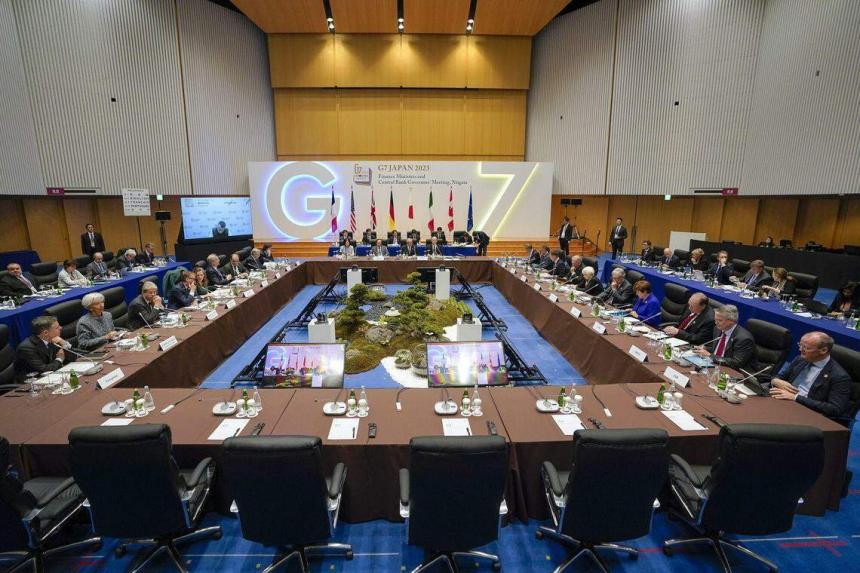G-7 Finance Ministers: Navigating Trade Disputes With The US

Table of Contents
Understanding the Scope of US Trade Disputes
Current US trade disputes are vast and multifaceted, posing significant challenges to the global economic order. The imposition of steel tariffs, Section 301 investigations targeting specific countries and industries, and other protectionist measures have sparked considerable tension. These actions represent a shift towards more unilateral US trade policy, impacting global trade relations.
- Impact on Global Supply Chains: The disruptions caused by these disputes have significantly affected global supply chains, leading to increased costs and delays for businesses worldwide.
- Effect on Specific G-7 Member Economies: Countries like Canada and the European Union, major trading partners of the US, have been particularly affected, experiencing retaliatory tariffs and reduced export volumes. This has had a knock-on effect on their respective domestic industries.
- Retaliatory Measures Taken by Other Nations: In response to US trade actions, many G-7 members have implemented retaliatory measures, further escalating tensions and creating a cycle of protectionism. This tit-for-tat approach has exacerbated global trade tensions.
- Rise in Protectionist Sentiment: The current climate has fueled protectionist sentiment globally, potentially hindering future trade liberalization efforts and undermining the rules-based international trading system. This rise in protectionism threatens the principles of free and fair trade.
The G-7's Role in Conflict Resolution
Historically, the G-7 has played a crucial role in fostering international economic cooperation. Its members possess considerable economic and political influence, making it a key player in mediating trade disputes. To address the current challenges, the G-7 can leverage several strategies:
- Diplomatic Initiatives and Negotiations: The G-7 can facilitate high-level diplomatic talks between the US and other affected nations, aiming to find common ground and de-escalate tensions through constructive dialogue.
- The Use of Existing Trade Agreements and Frameworks: The G-7 can utilize existing trade agreements and frameworks, like the WTO agreements, to resolve disputes through established channels and dispute resolution mechanisms.
- Exploring Alternative Dispute Resolution Mechanisms: When formal negotiations fail, alternative mechanisms such as mediation or arbitration could be explored to help find mutually acceptable solutions.
- Potential for Joint Statements or Declarations: Issuing joint statements or declarations expressing the G-7's commitment to multilateralism and free trade could help exert diplomatic pressure and promote a more cooperative approach. Such statements can help shape the international narrative.
Economic Consequences and Mitigation Strategies
Unresolved trade conflicts have severe economic ramifications, affecting GDP growth, inflation, and investment. The uncertainty created by these disputes discourages businesses from investing and expanding, dampening economic activity.
- Impact on Consumer Prices: Tariffs and trade barriers lead to higher consumer prices, reducing purchasing power and potentially fueling inflationary pressures.
- Effects on Specific Sectors: Sectors heavily reliant on international trade, such as the automotive and agricultural industries, are particularly vulnerable to the negative impacts of trade disputes.
- Potential for Global Recessionary Pressures: Prolonged trade conflicts can create a climate of uncertainty that could trigger a global recession, affecting all G-7 nations.
- Strategies for Economic Diversification and Resilience: To mitigate the negative economic impacts, G-7 nations need to focus on economic diversification, enhancing domestic production, and strengthening supply chain resilience. This involves investing in domestic capabilities and reducing over-reliance on specific trading partners.
The Search for Multilateral Solutions
Addressing these G-7 trade disputes requires a strong commitment to multilateral solutions rather than unilateral actions. The World Trade Organization (WTO) and other international bodies play a vital role in this process.
- Strengthening the WTO Dispute Settlement System: Reforming and strengthening the WTO's dispute settlement system is crucial for ensuring a fair and effective mechanism for resolving trade disagreements.
- Promoting Reforms to Outdated Trade Rules: Updating outdated trade rules to address the challenges posed by digital trade, e-commerce, and other contemporary issues is essential for modernizing the global trading system.
- Collaboration with Other International Organizations: The G-7 should collaborate closely with other international organizations, such as the UN and OECD, to foster a more coordinated and effective approach to resolving trade disputes.
Future Outlook and Potential for Collaboration
The trajectory of these trade disputes remains uncertain. However, there is potential for future G-7 cooperation to mitigate negative consequences.
- Prospects for De-escalation: Open communication, diplomatic efforts, and a commitment to multilateralism could pave the way for de-escalation and a more collaborative approach to trade.
- Potential for New Trade Agreements or Frameworks: The G-7 could explore the possibility of negotiating new trade agreements or frameworks that address the concerns of all member states and promote a more balanced and sustainable trading system.
- The Role of Technological Advancements: Technological advancements could offer opportunities to enhance transparency, improve supply chain efficiency, and promote more effective dispute resolution mechanisms.
Conclusion
The G-7's efforts to manage trade disputes with the US highlight the complexities of navigating global economic relations. The challenges are significant, ranging from the economic impact of protectionist measures to the need for robust multilateral solutions. Collaborative approaches, strengthened international institutions like the WTO, and a renewed commitment to the rules-based international trading system are crucial for mitigating negative economic consequences. Understanding the nuances of G-7 trade disputes requires continuous monitoring and analysis. Stay informed about the latest developments in G-7 trade policy and its impact on global economic stability. Continue reading our articles on G-7 Trade Disputes for deeper insights and a comprehensive understanding of this evolving landscape.

Featured Posts
-
 Cau Ma Da Du An Trong Diem Ket Noi Dong Nai Va Binh Phuoc Khoi Cong Thang 6
May 22, 2025
Cau Ma Da Du An Trong Diem Ket Noi Dong Nai Va Binh Phuoc Khoi Cong Thang 6
May 22, 2025 -
 Trans Australia Run Will A New Record Be Set
May 22, 2025
Trans Australia Run Will A New Record Be Set
May 22, 2025 -
 Premier Lig Ve La Liga Da Basari Klopp Ile Ancelotti Nin Karsilastirmasi
May 22, 2025
Premier Lig Ve La Liga Da Basari Klopp Ile Ancelotti Nin Karsilastirmasi
May 22, 2025 -
 Analyzing Air Traffic Control Outages Preventing Black Screens And Silent Radios
May 22, 2025
Analyzing Air Traffic Control Outages Preventing Black Screens And Silent Radios
May 22, 2025 -
 Become A Wyoming Guided Fishing Advisory Board Volunteer
May 22, 2025
Become A Wyoming Guided Fishing Advisory Board Volunteer
May 22, 2025
